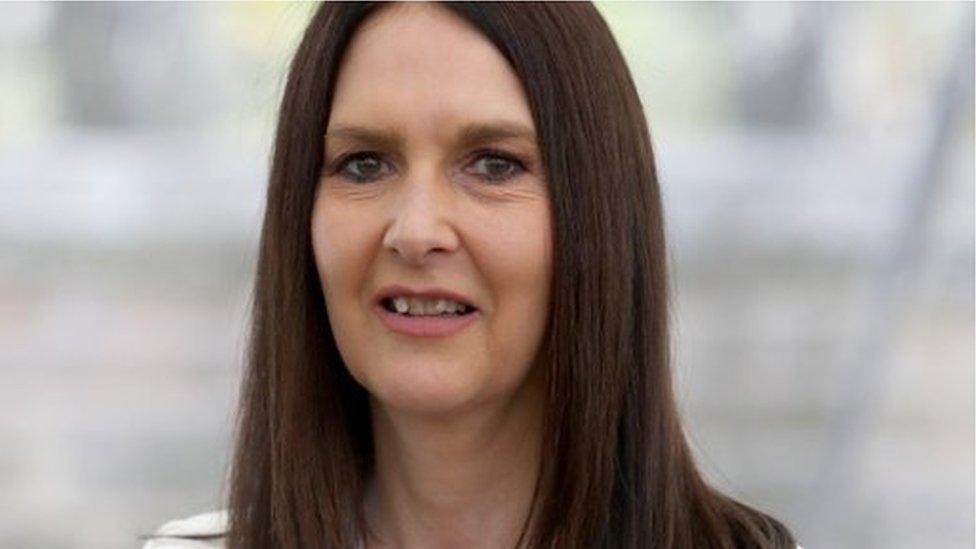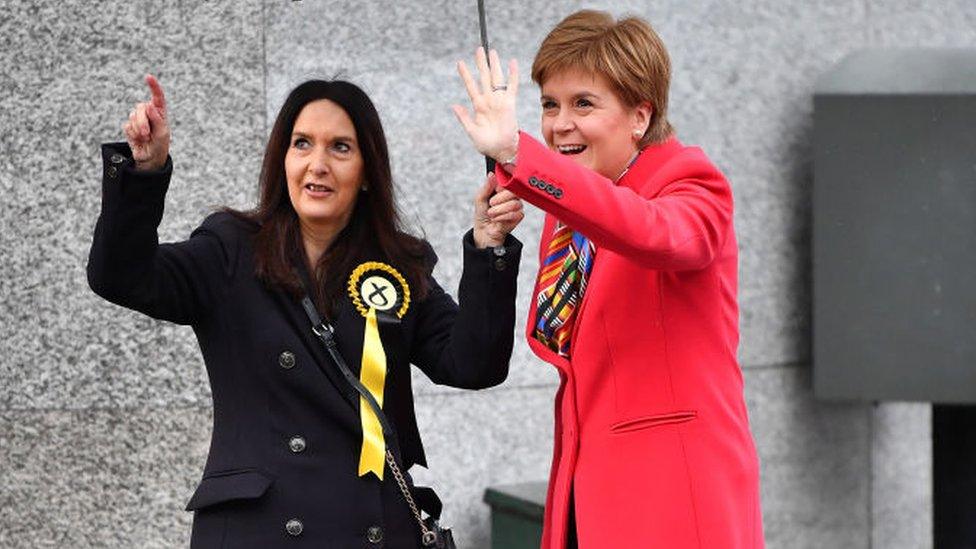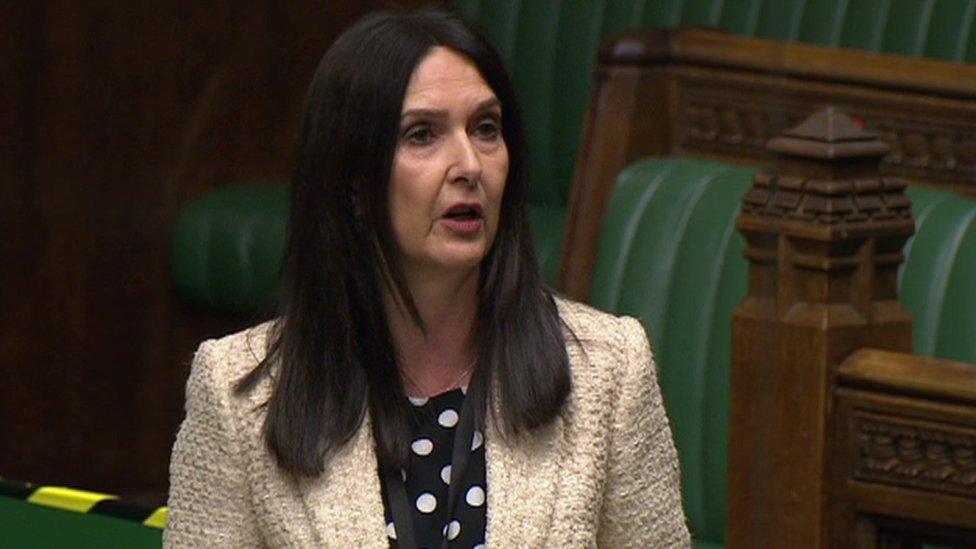Margaret Ferrier: MP faces Commons suspension for Covid train trip
- Published

The MP spoke in the House of Commons while awaiting the results of a Covid test
MP Margaret Ferrier should be suspended from the Commons for 30 days for breaching Covid rules, the standards committee has recommended.
The suspension would likely lead to a by-election in her Rutherglen and Hamilton West constituency if imposed.
Ferrier spoke in Parliament in September 2020 while awaiting the results of a Covid test.
She then took the train home to Glasgow after being told she had tested positive.
She lost the SNP whip and has since pleaded guilty to breaching Covid rules. She was sentenced to carry out 270 hours of community service.
The charge stated that she had failed to self-isolate and had "exposed people to risk of infection, illness and death".
MPs will vote on whether or not to follow the recommendations of the committee - and would generally back its suggested punishment.
Any MP suspended from the Commons for at least 10 days can be recalled and a by-election held if at least 10% of the registered voters in their constituency sign a petition calling for it to happen.
Labour would have high hopes of winning any by-election in the Rutherglen and Hamilton West constituency.
Ferrier had a majority of 5,230 at the last general election when she won it for the SNP, with Labour finishing second.
She has been sitting in the Commons as an independent MP since losing the SNP whip.
The parliamentary commissioner for standards, Daniel Greenberg, began an investigation into her conduct on 12 October following Ferrier's self-referral.
He concluded that she had put her own personal interest ahead of the public interest by not immediately self-isolating in London, and had therefore caused "possible risk of harm to health and life for people she came into contact with".
The commissioner also said her actions had "caused significant damage to the reputation and integrity of the House of Commons as a whole, and of its members generally" and noted that people in many other walks of life would have been sacked for a similar breach of the lockdown rules.
'Indication of remorse'
Ferrier told the commissioner her self-referral was "an open acceptance" and an "indication of remorse" that she had brought Parliament into disrepute.
But she maintains that she did not put her personal interest above that of the public.
Glasgow Sheriff Court was told last August that she had taken a Covid test on Saturday 26 September 2020 because she had a "tickly throat".
While awaiting her results, she went to church on the Sunday and gave a reading to the congregation, and later spent more than two hours in a bar in Prestwick, Ayrshire.
She then travelled to London by train - which had 183 passengers on board - on the Monday and spoke in the Commons later that day before finding out a short time later that she had tested positive for the virus.

Margaret Ferrier campaigning with SNP leader Nicola Sturgeon ahead of the 2019 General Election
Ferrier wore a face mask in the Commons, and after speaking in the chamber at about 19:30 had sat at a table with DUP MP Jim Shannon, where they conversed for 20 minutes.
The positive result from the test was delivered to her shortly after 20:00, by both text and email.
The MP decided to get a train back to Glasgow the following day, fearing she would have to self-isolate in a London hotel room for two weeks.
New SNP leader Humza Yousaf called on Ferrier to quit as an MP and said he would look forward to fighting a by-election in her constituency.
He added: "We've said from day one that Margaret Ferrier should have stepped down because of her reckless action.
"We'll take nothing for granted, we won't be complacent. We've got strong support in Rutherglen and right across that region but it will take hard work".
Shadow Scottish Secretary Ian Murray said said it was right that Parliament had "thrown the book" at Ferrier, and said the SNP still had questions to answer on what they knew and what they did at the time.
"Ferrier should do the right thing and stand down as an MP. Her constituents deserve better and that means a by-election", he said.
The recall process has only been used three times in the past.
In the first instance - a petition against DUP MP Ian Paisley in 2018 - the 10% threshold was not met.
However, it was met in the other two cases, against Labour MP Fiona Onasanya and Tory Chris Davies in 2019. Ms Onasanya did not contest the by-election in her seat, while Mr Davies stood in the by-election and lost.


The rules of the House of Commons mean that if an MP is suspended for 10 sitting days, a recall petition can be opened in their constituency.
The petition is open for six weeks, and if 10% of voters in the area sign it, it will trigger a by-election.
So there are a few hoops to jump through - the suspension is still to be approved by MPs, and given the ongoing parliamentary proceedings against Boris Johnson there is fierce debate about what sanctions should be applied for Covid rule breaches.
Ms Ferrier also has the right to appeal the committee's decision.
But it still seems likely there will be a by-election in Rutherglen and Hamilton West - a seat which has changed hands at the last three general elections.
Ms Ferrier won it for the SNP with a majority of 9.7% in 2019, but it was already a key target for Labour.
An early contest would be an immediate test for the SNP leader Humza Yousaf - and also for Labour counterparts Sir Keir Starmer and Anas Sarwar, in their quest to spark a revival in former Scottish heartlands.
- Published1 August 2023

- Published18 October 2022

- Published13 September 2022

- Published11 October 2020
